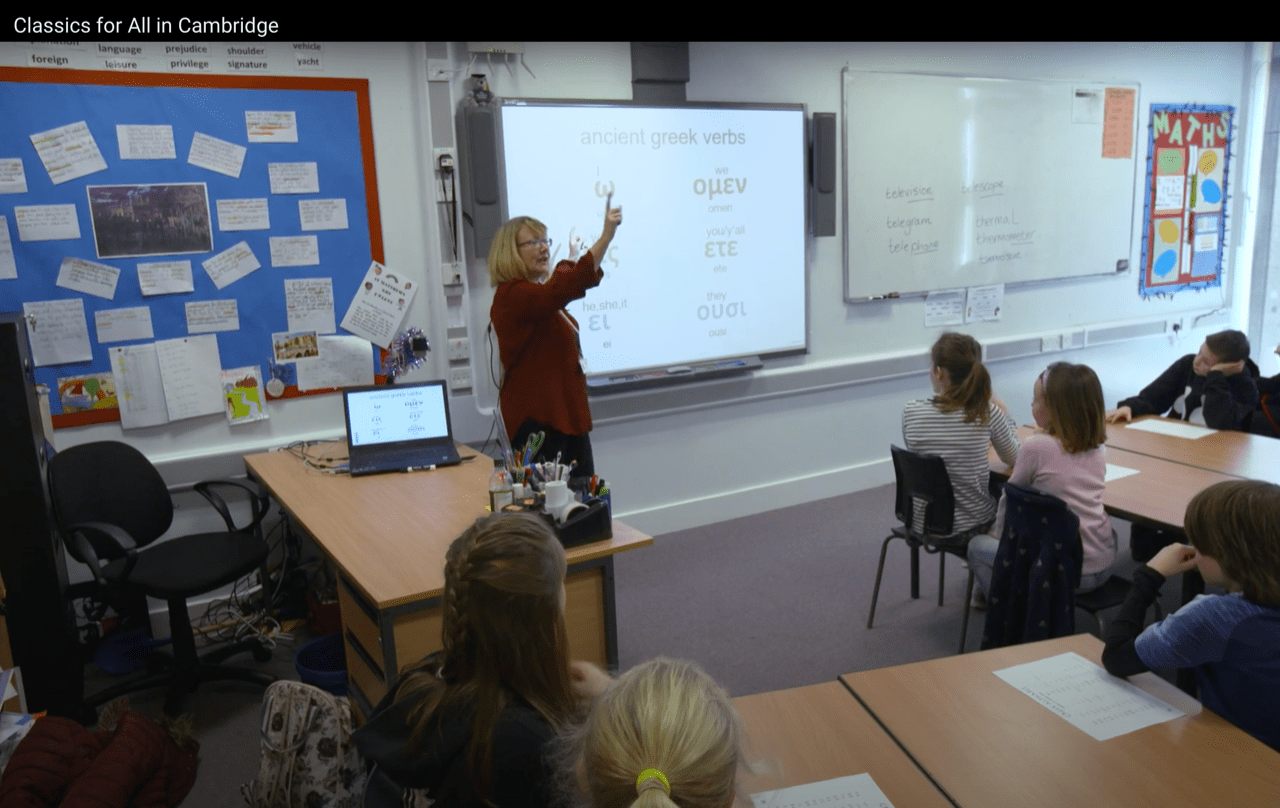Why do we learn Ancient Greek after all?
EUGENIA MANOLIDOU
Newspaper Kathimerini
May 14th, 2023

I read the interesting article by Professor Alexander Nehamas on the Sunday edition of “Kathimerini”, May 7th, 2023, regarding the teaching of Ancient Greek in Greece and abroad, and whether it is really necessary to read the texts in the original instead of using translations. In recent years, I have extensively engaged in the study of Ancient Greek, and for quite some time, I have been seeking the reasons that have caused Greek students to reject Ancient Greek, unlike students in other countries who love and respect it and, despite its difficulties, they persist in learning it.
Ancient Greek and Latin have been an integral part of European education for centuries. Teachers primarily presented the language through grammar rather than texts. However, in the mid-16th century, Johannes Posselius, a German professor of Ancient Greek, published a groundbreaking handbook that included dialogues in Ancient Greek and Latin, thereby making the texts more accessible. Presenting the language through everyday life and utilizing it in practical situations has proven to be an effective approach in teaching foreign languages. The ultimate goal is for students to master the language to the extent that they can read the original texts without relying on translation into their native language. Although Posselius’ ideas and methods were primarily focused on Latin and Greek, they had a broader influence on language instruction in general. His emphasis on active engagement, authentic use, and practical application of the language is considered a precursor to modern methodologies for teaching foreign languages.
I believe that the rejection of Ancient Greek by students in Greece can be attributed to the lack of practical application of the language and limited exposure to texts, a viewpoint that has prevailed internationally over the last few years. According to this viewpoint, educators are urged to emphasize on the importance of reading texts in the original language and to help students appreciate the beauty, significance, and value of ancient Greek literature. This approach to teaching classical languages aims to revive students’ interest in ancient texts.
The declining trend in education on a global scale has been the subject of study and reflection. As a counterbalance to this trend, which is further burdened by the difficulty of classical languages the way they are taught, and the invasion of technology that promotes speed and convenience, educational groups supported by universities and academies have been created. These groups aim to reintroduce the teaching of classical languages, starting from elementary school, using all four skills: writing, reading, speaking, and listening.
The Classics for All organization, the Iris project in collaboration with the organization Literacy through the Classics in the UK, “L’expérience Nausicaa: l’initiation au grec ancien à l’école” in Marseille, the program “Ancient Greeks – Young Heroes” in Belgium, and “Elliniki Agogi” in Greece are just a few of many initiatives that aim to teach classical languages from elementary school using the communicative approach so that children can acquire the necessary familiarity and avoid struggling in secondary school, with the results that we all more or less know. Similar movements exist in major academies and universities worldwide. Oxford recently added a class for spoken Latin and Greek, while the newly established Ralston College in Savannah, USA, offers a Humanities’ graduate program that includes the teaching of ancient Greek in combination with modern Greek. Its director, Joseph Conlon (Ph.D. Classical Philology, University of Princeton), believes that one cannot learn ancient Greek adequately without knowledge of modern Greek.
In short: There are methods and there is an easier way to learn; there are also books, teachers, and educational institutions. Therefore, anyone who wants to, can learn Ancient Greek without the element of obligation in universities, which, I agree, discourages students more than it attracts them. However, perhaps the discussion should focus not only on how we learn Ancient Greek but also on why; not because we are Greeks, but because we are citizens of the Western world. Prof. Nehamas mentioned Adamantios Korais in his article, and there have been dozens of intellectuals throughout the centuries, around the world, who emphasize on the benefits we gain by learning Ancient Greek. Recently, the French Minister of Education, Jean Michel Blanquer, also a supporter of teaching Ancient Greek in primary school, refers to Ancient Greek and Latin as the living heritage of Europe, necessary for the defense of our common values. A few months ago, the book “Classical Languages in Primary School: A Tool for Social Justice” by Evelien Bracke, published by Routledge, was released. Therefore, we don’t learn Ancient Greek only for the texts, and certainly not for its grammar or syntax. All these are tools that ultimately aim to help us approach the “good and virtuous citizen” (καλός κἀγαθός) of Socrates”, the “know thyself” (γνῶθι σαὐτόν) of Chilon, in order to eventually reach the fundamental principle of Philosophy, the art of “living well” (εὖ ζῆν).
EUGENIA MANOLIDOU
MUSICIAN
The article was published in Kathimerini newspaper, on Sunday May 14th 2023.
References:
• Bracke E., Classics at Primary School: A Tool for Social Justice, Routledge Focus, 2022
• Chrysoloras M., Ἐρωτήματα, Βιβλιοθήκη της Πολιτείας της Βαυαρίας, 1512
• Gottfried Heinrich Schaefer (εκδ.), Gregorii Corinthii et aliorum grammaticorum libri de dialectis linguæ Græcæ, Leipzig, Weigel, 1811.
• Lloyd E. M. and S. Hunt (editors), Communicative Approaches for Ancient Languages, Bloomsbury, 2021
• Posselius J. “Οἰκείων διαλόγων βιβλίον Ἑλληνιστὶ καὶ Ῥωμαϊστί», Impensis ZachariæSchureru, & eius Soc., 1601
• Richards J,. and T. Rodgers, Approaches and Methods in Language Teaching, 3rd edn, Cambridge: Cambridge University Press, 2014.
Articles
Latin and Greek are finding a voice at Oxford
Το παλιό λάθος των Αρχαίων Ελληνικών
Programs
• Classics for All
• Iris Project
• Literacy through Classics
• Ancient Greeks – Young Heroes Project
• L’expérience Nausicaa : l’initiation au grec ancien à l’école
• Ελληνική Αγωγή